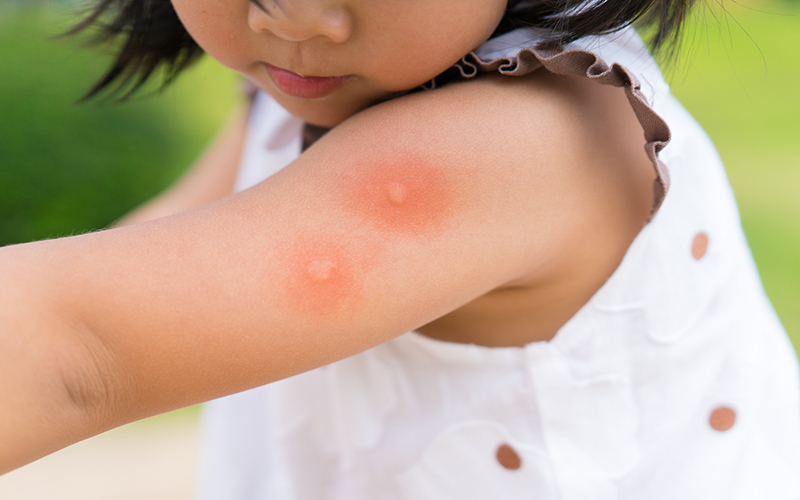
Maybe it was our rain-filled early summer, but the mosquitoes seem especially plentiful and hungry now. Because even a few mosquito nibbles* can make a person miserable for days, here’s some tips for preventing their itchy bites from chasing you indoors.
Cover up outdoors and indoors. Wear long-sleeved shirts and long pants outside. Use screens on windows and doors. Repair holes in screens to keep mosquitoes outdoors.
Be careful about what you wear. Don’t use scented soaps, perfumes or hair sprays because they may attract insects. Clothing with bright colors or flowery prints may also make you an insect target.
Stop mosquitoes from laying eggs in or near water. Check indoors and outdoors for containers that collect water. Once a week, empty and scrub, turn over, cover, or throw out items that hold water—tires, buckets, planters, toys, pools, birdbaths, flowerpots or trash containers could be potential skeeter-breeder zones.
Use insect repellent. Environmental Protection Agency (EPA)-registered insect repellents with one of the active ingredients below are proven safe and effective, even for pregnant and breastfeeding women.
- DEET
- Picaridin
- IR3535
- Oil of lemon eucalyptus (OLE)
- Para-menthane-diol (PMD)
- 2-undecanone
Tips for protecting babies and children from mosquitoes
- Dress children in clothing that covers arms, legs and feet.
- Cover strollers and baby carriers with mosquito netting.
- When using insect repellent on a child:
- Always follow label instructions.
- Do not use products containing oil of lemon eucalyptus (OLE) or para-menthane-diol (PMD) on children under 3 years old.
- Adults should spray insect repellent onto their hands and then apply to a child’s face. Do not apply insect repellent to a child’s hands, eyes, mouth, cuts or irritated skin.
- Wash or bathe the child’s treated skin after returning inside.
- Learn more about choosing an insect repellent for your child.
Tips for everyone
- Always follow the insect repellant label instructions. Apply the product safely.
- Reapply insect repellent as directed.
- Do not spray repellent on the skin under clothing.
- If you are also using sunscreen, apply sunscreen first and insect repellent second.
- The effectiveness of non-EPA registered insect repellents is not known, including natural insect repellents.
- If you are traveling to an area where you need to protect yourself against diseases spread by mosquitoes or ticks, the Centers for Disease Control and Environmental Protection Agency recommend using an EPA-registered insect repellent. Check the CDC Traveler’s Health info.
- Treat clothing like boots, pants and socks, as well as outdoor gear like tents and sleeping bags with 0.5% permethrin, an insecticide that kills or repels mosquitoes and provides protection after multiple washings. Clothing and gear pre-treated with permethrin is available. Read product information to find out how long the protection will last.
- Do not use permethrin products directly on skin.
- Watch the video, What You Need to Know About Permethrin.
*Most mosquitoes in the United States are just a nuisance and do not spread disease. It’s also good to know there have been no reported cases of West Nile, Zika or other mosquito-borne illnesses in Washington state in 2022.
Information courtesy of the Centers for Disease Control and healthychildren.org.

